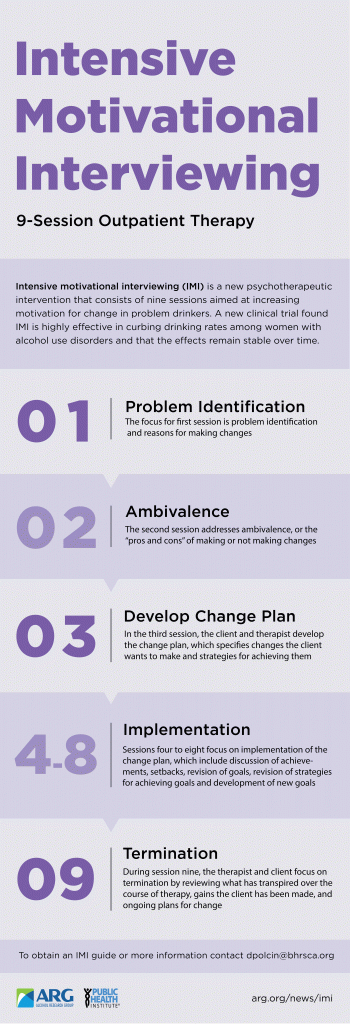
The treatment and recovery research undertaken by ARG scientists involves assessing service options, both formal and informal, to understand treatment utilization, help determine clinical best practices and make recommendations that assist people on their road to recovery.
Our studies have measured outcomes of participating in 12-step programs and their alternatives, assessed the positive outcomes experienced by residents of sober living houses, reviewed effectiveness of counseling approaches, developed and tested innovative interventions, identified gaps in service provision for particular populations, and surveyed individuals in recovery to understand how they define recovery.
What is Recovery?
Recovery is a goal of alcohol treatment and recovery-oriented systems of care and services are being developed to support that goal. Alcoholics who no longer drink and are trying to pursue an improved way of living/being say that they are ‘in recovery.’ Yet for all its use there has been no agreed upon definition of the term within the alcohol literature. Lacking a definition, recovery usually is equated with abstinence or symptom remission even though it is not so narrowly circumscribed by those who say they are in recovery.
First of its kind, ARG senior scientist Lee Ann Kaskutas and her team developed a recovery definition that is based on how people who have been through the experience of recovery define the term. The researchers asked over 9300 individuals what recovery means to them, resulting in a definition that takes into consideration personal experiences, individual understanding, and elements not often considered.
The result? A rich and multi-layered look at recovery.
Recovery Housing
Recovery housing or sober living housing (SLH) is an intervention that is specifically designed to address the recovering person’s need for a safe and healthy living environment, supplying the necessary recovery and peer supports individuals need. Recovery residences go by different names, like Oxford Houses, sober living houses, recovery homes, and halfway houses.
 Recovery housing has existed as a recovery option since the 1970s yet they have been largely ignored in the addiction and criminal justice literatures until recent investigations by our team at ARG. Beginning in the early 2000s, Doug Polcin began https://arg.org/staff/douglas-l-polcin/examining this type of housing and what should be considered when doing this research, such as general outcomes for those who are residents, characteristics of individuals with the best outcomes, and recommendations for lengths of stay. Amy Mericle later joined the research team at ARG that has been examining these homes as a recovery residence option.
Recovery housing has existed as a recovery option since the 1970s yet they have been largely ignored in the addiction and criminal justice literatures until recent investigations by our team at ARG. Beginning in the early 2000s, Doug Polcin began https://arg.org/staff/douglas-l-polcin/examining this type of housing and what should be considered when doing this research, such as general outcomes for those who are residents, characteristics of individuals with the best outcomes, and recommendations for lengths of stay. Amy Mericle later joined the research team at ARG that has been examining these homes as a recovery residence option.
New Recovery Housing Study to Map & Gather Key Data
In the first of its kind, the National Study of Treatment and Addiction Recovery Residences (NSTARR), led by Amy Mericle, is a four-year study that will gather information on the availability of recovery housing across the U.S., including where houses are located and environments that support them. It will also collect characteristics of the residences, including policies, practices, programming, and service delivery models to see if differences or similarities vary by geographical location and to determine if these characteristics are informed by evidence-based practices.
—DR. MERICLE TALKS ABOUT RECOVERY HOUSING & HER NEW PROJECT (VIDEO)—
One of the project’s goals is to establish a national database of recovery residences – an essential tool to help build and foster research on recovery housing’s role in supporting a phttps://arg.org/news/amy-mericle-talks-about-the-importance-of-the-nstarr-study/erson’s sobriety. A survey is also planned which will include a random sample of 800 houses stratified by state.
Viable Options to 12-Step Programs
People with an alcohol use disorder who participated in alternative mutual help groups had abstinence outcomes equivalent to those who participated in traditional 12-step groups at the same level. Senior scientist and Center associate director Sarah E. Zemore and colleagues led the study, which was the first longitudinal, comparative study of 12-step groups and their alternatives, including Women for Sobriety (WFS), LifeRing Secular Recovery (LifeRing), and SMART Recovery (SMART).
Results suggest that mutual help group involvement—measured as meeting attendance; having a regular or home group; having a close friend or sponsor in the group; leading, convening, or facilitating meetings; and doing volunteer or service work—offers equivalent benefits in relation to substance use and problems regardless of group choice.
 New Treatment Program Helps Women Drink Less
New Treatment Program Helps Women Drink Less
A new clinical trial shows that intensive motivational interviewing (IMI), an intervention that was first used to treat methamphetamine dependence, is highly effective in curbing how much women with alcohol problems drank two months after the program ended with consumption levels sustained at the six-month follow-up. Women who were heavy drinkers experienced the greatest effect. Heavy drinking was defined as drinking 14 or more days to the point of intoxication over the past 30 days.
IMI offers a promising intervention that can work on its own without the need for long term case management or consumption monitoring after treatment ends.
IMI is unique in that it offers a treatment protocol that participants found fit within their busy lives and at the same time provides greater support across a range of issues to help them meet and sustain their goals over the long term. Essentially, IMI meets women where they’re at.
Self-Administered Intervention Helps Women Reduce Their Drinking
A new study from ARG Scientist Madhabika Nayak and colleagues found that women who were risky drinkers and completed an electronic screening and brief intervention (e-SBI) program called DrinkWise significantly reduced their weekly alcohol use and heavy alcohol use at the six-month follow up, compared to those who did not complete the program. This is the first non-intensive (single session), self-administered e-SBI in English and Spanish that has shown efficacy for reducing alcohol use in a randomized trial.
Armed with personalized information and specific guidance, women can make informed decisions and incorporate simple changes in their alcohol use.
Related Publications
Mericle, A. A., Sheridan, D., Howell, J., Braucht, G. S., Karriker-Jaffe, K., Polcin, D.L. (2020) Sheltering in place and social distancing when the services provided are housing and social support: The COVID-19 health crisis and recovery housing, Journal of Substance Abuse Treatment. Abstract or Full Text
Witbrodt, J.,Polcin,D.L., Korcha, R., Li, L. (2020). Beneficial effects of motivational interviewing case management: A latent class analysis of recovery capital among sober living residents with criminal justice involvement. Drug and Alcohol Dependence, 200 124-132 Abstract or Full Text
Tsutsumi S., Timko C., Zemore S.E. (2020). Ambivalent attendees: Transitions in group affiliation among those who choose a 12-step alternative for addiction.. Addictive Behaviors, 102 Abstract or Full Text
Nayak, M.B., Kaskutas, L.A., Mericle, A.A., (2019). Randomized Trial of an Innovative Electronic Screening and Brief Intervention for Reducing Drinking Among Women of Childbearing Age., Abstract or Full Text
Subbaraman, M.S., Barnett, S.B., Karriker-Jaffe, K.J., (2019). Risks Associated with Mid level Cannabis Use Among People Treated for Alcohol Use Disorder. Alcoholism Clinical and Experimental Research , 43 (4) Abstract or Full Text
Mericle, A.A., Carrico, A.W., Hemberg, J., Stall, R., Polcin, D.L. (2019). Improving recovery outcomes among MSM: the potential role of recovery housing. Journal of Substance Use, 24 (2) 140-146 Abstract or Full Text
Polcin D.L., Nayak M.B., Korcha R., Pugh S., Witbrodt J., Salinardi M., Galloway G., Nelson E. (2019). Heavy Drinking among Women Receiving Intensive Motivational Interviewing: 6-Month Outcomes. Journal of Psychoactive Drugs, July 21 1-10 Abstract or Full Text
Witbrodt, J., Polcin, D.L., Korcha, R., Li, L. (2019). Beneficial effects of motivational interviewing case management: a latent class analysis of recovery capital among sober living residents with criminal justice involvement.. Drug and Alcohol Dependence, 200 124-132 Abstract or Full Text
Mericle A.A., Mahoney E., Korcha R., Delucchi K., Polcin D.L. (2019). Sober living house characteristics: a multilevel analyses of factors associated with improved outcomes. Journal of Substance Abuse Treatment, 98 28-38 Abstract or Full Text
Polcin, D.L., Korcha, R., Nayak, M., (2018). Development of intensive motivational interviewing (IMI) and modifications for treating women with alcohol use disorders. Journal of Contemporary Psychotherapy, 48 (2) 51-59 Abstract or Full Text
Polcin, D.L. (2018). Role of recovery residences in criminal justice reform.. International Journal of Drug Policy, 52 32-36 Abstract or Full Text
Polcin, D.L., Korcha, R., Witbrodt, J., Mericle, A.A., Mahoney, E., (2018). Motivational Interviewing Case Management (MICM) for persons on probation or parole entering sober living houses. Criminal Justice and Behavior, 45 (11) 1634-1659 Abstract or Full Text
Pinedo, M., Zemore, S., Rogers, S. (2018). Understanding barriers to specialty substance abuse treatment among Latinos. Journal of Substance Abuse Treatment, 94 1-8 Abstract or Full Text
Mericle, A.A., de Guzman, R., Hemberg, J., Yette, E., Drabble, L., Trocki, K., (2018). Delivering LGBT-sensitive substance use treatment to sexual minority women. Journal of Gay & Lesbian Social Services, 30 (4) Abstract or Full Text
Karriker-Jaffe, K.J., Subbaraman, M.S., Greenfield, T.K., Kerr, W.C., (2018). Contribution of alcohol and drug co-use to substance use problems. Nordic Studies on Alcohol and Drugs Impact, 35 482-442 Abstract or Full Text
Polcin, D.L., Korcha, R., Pugh, S., Witbrodt, J., Salinardi, M., Galloway, G., Nayak, M., Nelson, E., (2018). Intensive motivational interviewing for heavy drinking among women. Addictive Disorders & Their Treatment, 18 (2) 70-80 Abstract or Full Text
Subbaraman, M. S., Metrik, J., Patterson, D., Stout, R. L. (2018). Cannabis use during alcohol treatment is associated with alcohol-related problems one-year post-treatment. Drug and Alcohol Dependence, 193 29-34 Abstract or Full Text
Zemore, S.E., Lui, C.K., Mericle, A., Hemberg,J., Kaskutas, L.A. (2018). A longitudinal study of the comparative efficacy of Women for Sobriety, LifeRing, SMART Recovery, and 12-step groups for those with AUD. Journal of Substance Abuse Treatment , 88 18-26 Abstract or Full Text
Klinger, J.L., Karriker-Jaffe, K.J., Witbrodt, J., Kaskutas, L.A. (2018). Effects of distance to treatment on subsequent alcohol consumption. Drugs: Education Prevention and Policy, 25 (2) 173-80 Abstract or Full Text
Karriker-Jaffe, K.J., Witbrodt, J., Subbaraman, M.S., Kaskutas, L.A. (2018). What happens after treatment? Long-term effects of continued substance use, psychiatric problems and help-seeking on social status of alcohol-dependent individuals. Alcohol and Alcoholism, 53 394-402 Abstract or Full Text
Karriker-Jaffe, K.J., Klinger, J.L., Witbrodt, J., Kaskutas, L.A., (2018). Effects of treatment type on alcohol consumption partially mediated by Alcoholics Anonymous attendance. Substance Use Misuse, 53 (4) 596-605 Abstract or Full Text





